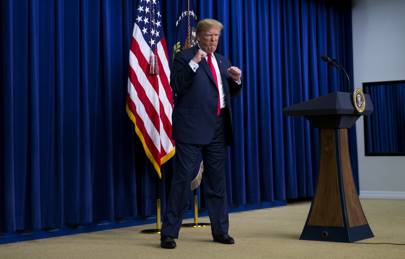 The most recent shot in the technology war between Washington and Beijing is the Trump administration’s decision to deny China Mobile entry into the US market. This move follows plans to strengthen the review of Chinese investment in US technology companies; the banning of the sale of ZTE and Huawei smartphones on military bases; sanctions on ZTE that could have killed the company if they had not been overturned by the president; and the imposition of 25 per cent tariffs on $50 billion worth of Chinese goods related to technology. There is no end in sight of the trade tensions, and the desire to disentangle the US and Chinese technology systems will have long-lasting effect on companies and consumers on both sides of the Pacific.
The most recent shot in the technology war between Washington and Beijing is the Trump administration’s decision to deny China Mobile entry into the US market. This move follows plans to strengthen the review of Chinese investment in US technology companies; the banning of the sale of ZTE and Huawei smartphones on military bases; sanctions on ZTE that could have killed the company if they had not been overturned by the president; and the imposition of 25 per cent tariffs on $50 billion worth of Chinese goods related to technology. There is no end in sight of the trade tensions, and the desire to disentangle the US and Chinese technology systems will have long-lasting effect on companies and consumers on both sides of the Pacific.
Why is this happening? The Trump administration has cited a mix of national security and economic justifications for the measures it has taken against Chinese technology. US policymakers have long complained that American companies were forced to transfer technology to Chinese partners as the prices of access to the market. More recently, Washington has sounded alarms about Made in China 2025, a $300 billion program to dominate automation, new energy, 3D printing, and other industries of the future. It has also blocked the state-backed purchases of Western companies, especially in the semiconductor sector.
The United States has also accused Chinese hackers of the theft of intellectual property and business secrets. While rates of hacking declined after a September 2015 agreement between presidents Xi Jinping and Barack Obama, Trump officials now claim that the hacking continues. Intelligence experts have cautioned that the use of ZTE and Huawei products is a cybersecurity risk, one that will be compounded by the move to 5G. The United States has also reportedly warned Australia that bilateral security ties are at risk if the Turnbull government allows Huawei to build 5G wireless networks in the country.
The technology war is not one-sided. Beijing also has economic and security concerns about dependence on US technology. Chinese policymakers worry that the economy is too dependent on labor-intensive, low-end manufacturing and too reliant on foreign technology. Made in China 2025, for example, seeks to substitute Chinese products for foreign goods, and targets 70 per cent “self-sufficiency” in core components in industries like industrial robots and telecommunication equipment.
Even before the revelations of the NSA contractor Edward Snowden, Chinese leaders believed that dependence on foreign technology made them vulnerable to cyber attacks. China’s Cybersecurity Law, introduced in June 2017, address both security and industrial policy goals. It requires network operators in critical sectors to store within the country all data that is gathered or produced in China.
Compliance with this data localisation provision will require foreign firms either to invest in expensive new data servers in China, or to contract with a local server provider, such as Huawei, Tencent, or Alibaba. Apple, for example, partnered with Guizhou-Cloud Big Data Industry to store the data of Chinese residents. In addition, foreign firms could be required under the law to provide source code or other proprietary information to the government for review, increasing the risks of technology being passed on to local competitors or used by the government.
The odd reality of life under China's all-seeing credit score system
While the US is right to push back against China's theft of intellectual property and discriminatory industrial policies, there is little hope that Washington can convince Beijing to abandon its plans to develop a more competitive technology industry. In fact, China is likely to double down on efforts to end dependence on Western companies. In the face of complaints about Made in China 2025 and sanctions on ZTE, for example, President Xi Jinping called on a gathering of the country’s top scientists to make breakthroughs on core technologies. “Self-determination and innovation is the unavoidable path,” he said.
US policymakers must also be aware that technology companies have built and benefited from global supply chains that are often located in China. Efforts to dismantle these economic relationships will hurt the competitiveness of US companies, which are both suppliers and customers of Chinese firms.
Neither side knows where the trade war will end. Where the business community once played a moderating role in Sino-US relations, it is now battered by political forces it does not seem able to control. In the short term, the likely effect is higher costs for consumers, greater uncertainty for companies, and only marginally improved cybersecurity. The long term outcome, however unlikely, could be two blocs facing off in a technology cold war.
Adam Segal (@adschina) is the director of the Digital and Cyberspace Policy Program at the Council on Foreign Relations
No comments:
Post a Comment